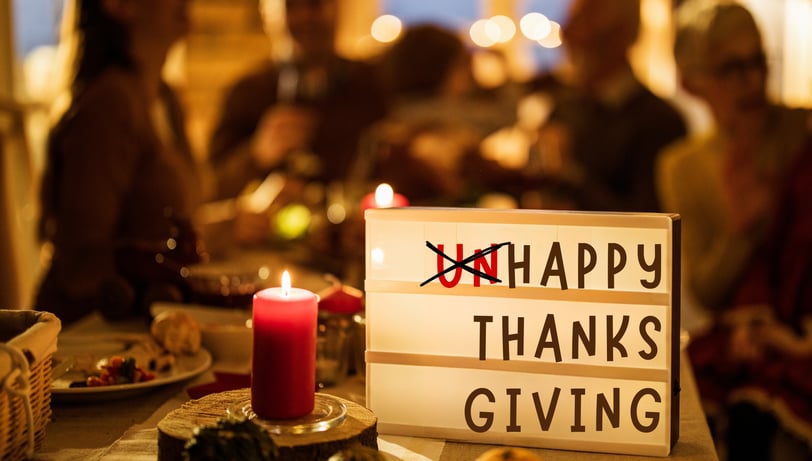Thanksgiving Survival Guide: Protecting Yourself from Narcissistic Tactics and Holiday Drama
Dread the holidays? You're not alone. Thanksgiving is prime time for narcissists to lovebomb, gaslight, and humiliate their victims under the guise of family togetherness. Learn how to spot their tricks, navigate common scenarios, and protect your peace. This guide offers practical strategies to set boundaries, avoid toxic dynamics, and truly enjoy the holiday—on your terms.
RELATIONSHIPSFUN & FROLICKINGTRAUMA & ABUSE
Tyrone
11/28/20243 min read


Thanksgiving with a Narcissist: Protecting Your Peace and Enjoying the Holiday
For many, Thanksgiving isn't just a celebration of gratitude—it's the kickoff to the "haunting season," where holiday gatherings become a battleground of past traumas, family triggers, and social expectations. We’re told to set aside our feelings and sit down with people who might not like us—and whom we don’t like—all in the name of tradition.
Unfortunately, narcissists thrive in this environment. The holidays are their hunting season. Everyone's in the mood to connect, which gives them the perfect opportunity to gather "supply" through lovebombing, backhanded compliments, and public humiliation. But you don’t have to play along. Here’s how to spot their tactics, protect yourself, and enjoy your holiday on your terms.
Three Scenarios to Watch For
1. The Lovebomb and Guilt Trap
You’ve been voluntold to join the family gathering as someone’s “plus one too many.” Maybe it’s a cousin who insists they just had to bring you because “nobody should be alone for the holidays.” From the start, the narcissist showers you with over-the-top compliments:
“You’re so impressive! I don’t know why anyone would let you spend Thanksgiving alone.”
“This meal is amazing, but not as amazing as you!”
By the time dessert rolls around, the mood changes. Now, they’re calling you out publicly for something trivial. Maybe they mention your lack of a relationship or mock your career with a smile plastered on their face, so they seem harmless. Suddenly, you’re caught in their web of humiliation.
How to Handle It:
Set Boundaries Early: Politely but firmly let the inviter know you’ll leave if things get uncomfortable.
Don’t Take the Bait: Acknowledge compliments with a simple “thank you,” and ignore attempts to drag you into public scrutiny.
Have an Exit Plan: Always have a way to leave if things get toxic—whether it’s driving yourself or arranging a pickup.
2. The Public Put-Downs Disguised as Jokes
Narcissists use the holiday table as their stage. Imagine sitting there, enjoying your turkey, when they throw in a casual jab:
“Wow, someone’s not afraid to pile on the mashed potatoes!”
“Remember that time you burned the turkey? Classic!”
The table erupts in awkward laughter while you feel the sting of being singled out. If you respond, they’ll act shocked: “Can’t you take a joke?” Now, you’re the problem.
How to Handle It:
Stay Calm: Respond with a neutral “Huh, that’s an interesting comment” and change the subject.
Practice the Grey Rock Method: Keep your responses dull and unemotional, depriving them of a reaction.
Speak to a Trusted Ally: Quietly let a supportive family member know what’s happening so you don’t feel isolated.
3. The Diplomat Who Enables Drama
Every family has that one person—the “peacemaker” who insists on bringing everyone together, even when they know certain individuals are toxic. This person might say:
“Can’t you just let it go for one day? It’s Thanksgiving!”
“I promised them you’d come. Don’t make me look bad!”
The diplomat minimizes your concerns, making you feel like the bad guy for prioritizing your peace.
How to Handle It:
State Your Boundaries Clearly: “I understand you want everyone together, but I won’t tolerate being disrespected or humiliated.”
Decline Invitations Without Guilt: “I won’t be able to make it this year, but I hope you have a wonderful time.”
Have a Backup Plan: If you decide to go, be ready to leave at the first sign of trouble. Prioritize your mental health over someone else’s expectations.
How to Protect Yourself
Know Your Limits
You don’t have to force yourself into situations where you know you’ll feel uncomfortable or unsafe. Remember: saying no to someone else’s version of fun is saying yes to yourself.Practice Gratitude on Your Terms
Gratitude doesn’t mean tolerating bad behavior or excusing abuse. Be thankful for the good in your life—but don’t feel obligated to fake gratitude for toxic people just to fit in.Be Prepared to Leave
Always have an exit strategy. Drive yourself, schedule an Uber, or arrange for a friend to call you with a pre-planned “emergency.”Use the Grey Rock Method
If you must interact with a narcissist, keep your responses short and uninteresting. Don’t engage emotionally, and avoid giving them the reaction they’re looking for.Focus on What Brings You Joy
If a big family gathering isn’t your thing, create your own traditions. Spend the day with friends, volunteer, or indulge in your favorite activities. The holiday should feel like a celebration, not an obligation.
Final Thoughts
Thanksgiving should be about gratitude, connection, and joy—not dread, humiliation, or sacrifice. If past experiences have left you feeling drained or hurt, it’s okay to prioritize your peace this year. Whether you spend the holiday with loved ones, alone, or with chosen family, remember: the best way to protect your mental health is to stay true to yourself.
Don’t fall for the gaslighting or lovebombing. Stay strong, set boundaries, and make this Thanksgiving a celebration of your well-being.

